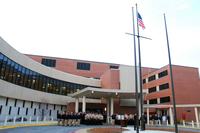"Though Defense Secretary Donald Rumsfeld has repeatedly bashed the medias continuous coverage of insurgent bombings in Iraq and Afghanistan," Inside Defense notes, "it turns out the Pentagons command center relies very heavily on such press reports to gather real-time intelligence."
The National Military Command Center, a windowless underground facility located beneath the Pentagon, must constantly provide information about current events to the chairman of the Joint Chiefs of Staff, the defense secretary and ultimately the president.
The center has many military means of gathering intelligence, including classified computer networks and space-based systems, but standard television news reports are often the best way to stay abreast of events in Iraq and Afghanistan, according to Rear Adm. Ronald Henderson, deputy director of operations for the Joint Staff.
Perhaps our best source of information is the television, Henderson said June 19 during a panel discussion in Washington sponsored by the Armed Forces Communications and Electronics Association.
And in fact, if you were to come into the command center, you would see six big, giant TV screens, he said. Now I spend a lot of time watching TV because -- if you think about it -- its the best intelligence network in the world.
It's become almost a cliche that 80 percent or more of intelligence work comes from "open source" materials, like press reports. So it's always been kind of a mystery to me why the administration and Pentagon chiefs constantly go after the media, when reporters are actually helping these guys do their jobs. It's like beating up on Raytheon for making missiles, or Motorola for building radios.
Does a free press mean that embarrassing, even dangerous, details about American operations will occasionally get disclosed? Yup. Does it mean that media reports will sometimes be more negative and sensational than the military would like? Of course. But if what you get in return is the "best intelligence network in the world," isn't that a price worth paying?
UPDATE 10:37 AM: One Pentagon agency that's been particularly aggro in its dealing with the press has been the Joint IED Defeat Organization. The groups, which started in 2003 as a "12-person office to develop quick strategies for combating homemade bombs in Iraq -- has quietly expanded into a $3 billion-per-year arm of the Pentagon, with more than 300 employees and thousands of contract workers," the Boston Globe notes. And like most fast-growing start-ups, the JIEDDO is having trouble figuring out what its focus should be.
General John Abizaid , the head of US military forces in the Middle East, recently complained to members of the IED group that its emphasis on multimillion-dollar contracts to develop high-tech sensing equipment has been ineffective at curbing attacks by homemade bombs, according to a person who was present.
Abizaid said the office... should focus more on nontechnical solutions, such as figuring out where the explosives are coming from and who is planting them, the official said.
A recent report commissioned by the Pentagon, written by a team of counter-insurgency specialists and provided to Abizaid, was blunt: "The response to the IED has been primarily to increase force protection by emphasizing technical solutions which have proven insufficient," said the internal report, a copy of which was obtained by the Globe...
Interviews with current and former members of the task force -- all of whom requested anonymity because they are not authorized by the Pentagon to speak to the media -- revealed widespread frustration that money and other resources were going into long-term deals with major defense contractors.
"This is a perfect example of a Cold War mind-set," said one former official who held a senior post in the office and has since left government...
Some members of the House and Senate share the concern that by focusing on longer-term projects, the task force is squandering its mission to provide quick, on-the-ground solutions to homemade bombs, whether through technology or intelligence.
(Big ups: RC)







